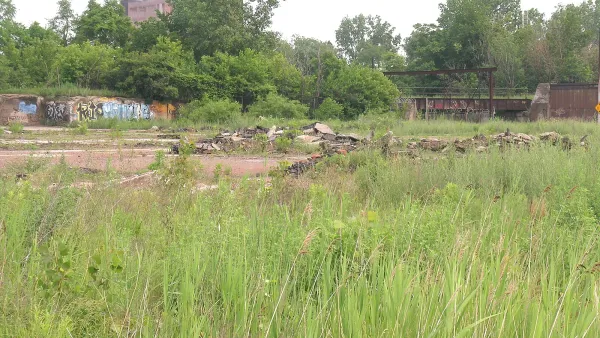Thanks to the National Vacant Properties Campaign for another important conference on vacant properties - this time in Louisville. I was duly impressed with the first conference on the subject a year and a half ago but what struck me this time was the growing diversity of voices concerned with the issue. At the last conference, I (and I assume many others) had the feeling that it was a therapy session of sorts for like-minded spirits. "Older industrial" cities were sharing information and ideas because, while all cities are unique, we share a lot of the same challenges.
Thanks to the National Vacant Properties Campaign for another important conference on vacant properties - this time in Louisville. I was duly impressed with the first conference on the subject a year and a half ago but what struck me this time was the growing diversity of voices concerned with the issue.
At the last conference, I (and I assume many others) had the feeling that it was a therapy session of sorts for like-minded spirits. "Older industrial" cities were sharing information and ideas because, while all cities are unique, we share a lot of the same challenges.
This year's conference clearly demonstrated the problem of vacancy is not just for older industrial cities. Sure the usual suspects were in attendance but so too were Phoenix and other cities of the south and southwest typically known more for their growth than any kind of decline. The foreclosure crisis has brought more people to the table which makes for a richer and more varied discussion. The Campaign has long stated that vacancy is not "confined to urban and industrial areas" but a "national phenomenon." Seems this has sunken in.
I hope that the work of the Campaign will continue to reflect this new national awareness of the problem. The scale of the problem and the resources available to address it vary significantly from small town to big city. Maybe future conferences can facilitate sessions targeted to specific groups - big city forums, for instance, where places like Philadelphia, Chicago and Los Angeles (eg.) can trade ideas. In a similar vein, suburban vacancy, whether due to age, over-construction or other factors, is a different animal yet relatively understudied (compared to the usual urban sort). Additional research and discussions targeted to these issues would help to market pragmatic and creative solutions already underway. Regardless of location, density or scale, what's clear is that as the nation's housing issues continue, these types of forums are more important than ever.

Analysis: Cybertruck Fatality Rate Far Exceeds That of Ford Pinto
The Tesla Cybertruck was recalled seven times last year.

National Parks Layoffs Will Cause Communities to Lose Billions
Thousands of essential park workers were laid off this week, just before the busy spring break season.

Retro-silient?: America’s First “Eco-burb,” The Woodlands Turns 50
A master-planned community north of Houston offers lessons on green infrastructure and resilient design, but falls short of its founder’s lofty affordability and walkability goals.

Test News Post 1
This is a summary

Analysis: Cybertruck Fatality Rate Far Exceeds That of Ford Pinto
The Tesla Cybertruck was recalled seven times last year.

Test News Headline 46
Test for the image on the front page.
Urban Design for Planners 1: Software Tools
This six-course series explores essential urban design concepts using open source software and equips planners with the tools they need to participate fully in the urban design process.
Planning for Universal Design
Learn the tools for implementing Universal Design in planning regulations.
EMC Planning Group, Inc.
Planetizen
Planetizen
Mpact (formerly Rail~Volution)
Great Falls Development Authority, Inc.
HUDs Office of Policy Development and Research
NYU Wagner Graduate School of Public Service





























